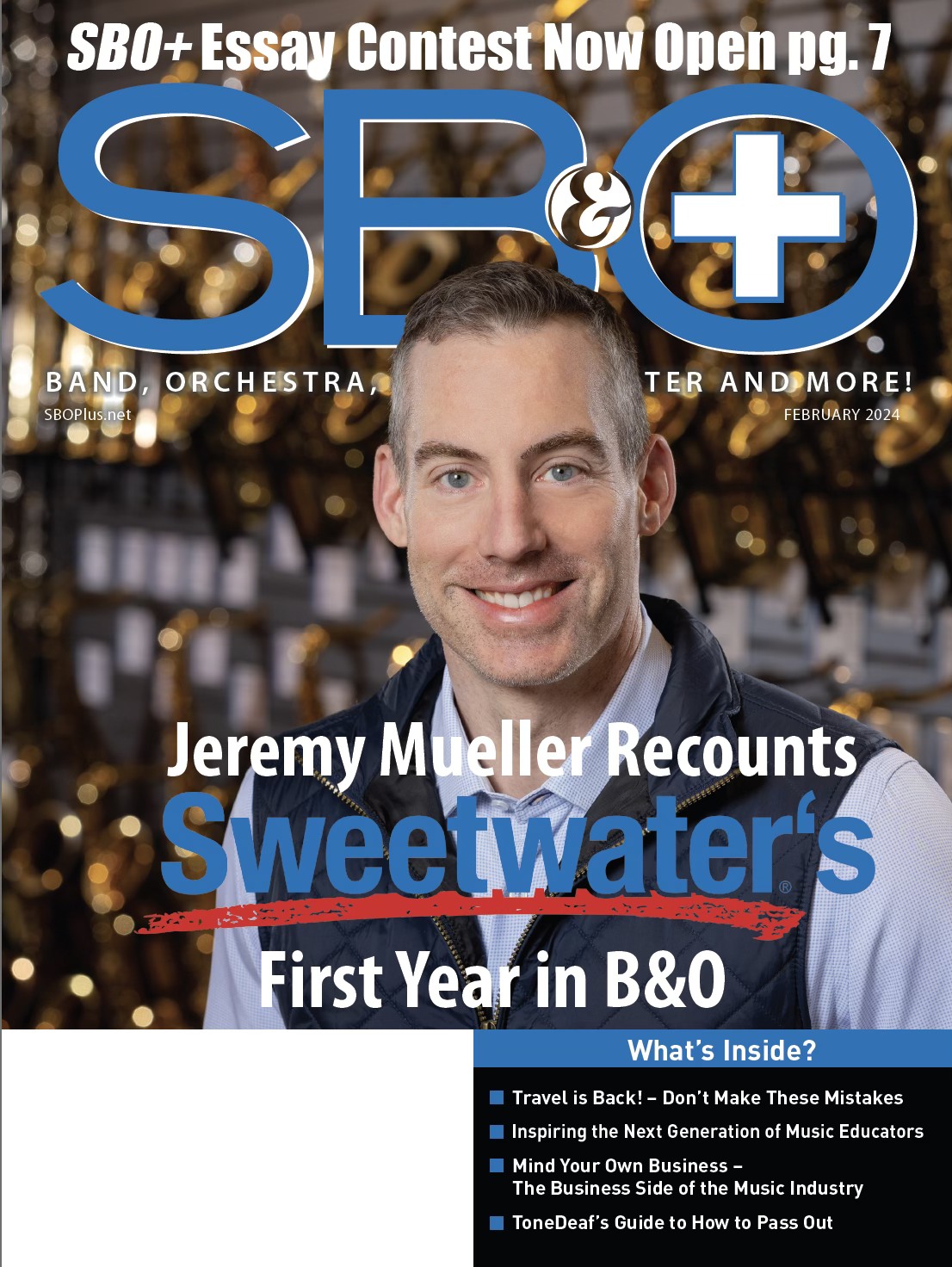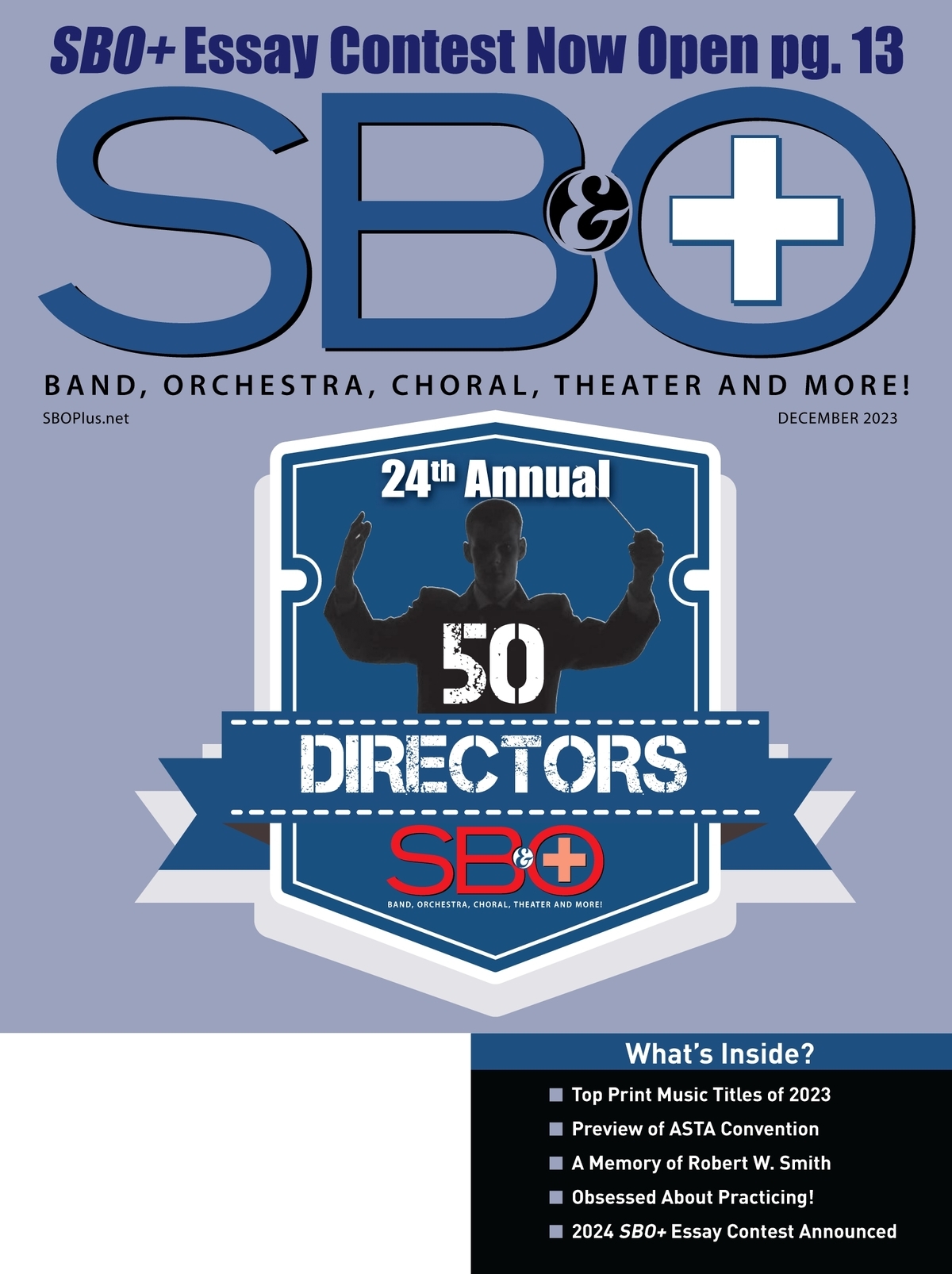EDUCATORS SUBSCRIBE FOR AS LOW AS $0.00! CLICK HERE!
-

Scholarship Winners: SBO contest Winners
Mike Lawson | October 30, 2006By Christian Wissmuller
School Band and Orchestra's sixth annual music student essay contest attracted the most entries since the launch of our program, with well over 13,000 submissions. This year's topic, "How Music Education Has Made Me a Better Student," spoke to the far-reaching benefits of music scholarship on young lives - a topic which has been covered at length in many media outlets, including this one.
Our participants' stories reinforced and confirmed longstanding assertions made by advocates for music education. Among other things, students shared how studying music: leads to greater academic achievement in all areas; fosters self-confidence and social skills; provides a valuable emotional outlet; and strengthens organizational and leadership skills.
Read More... -

Preparation: Overcoming the Pressures of Performing
Mike Lawson | October 22, 2006
By Lindsey BerthiaumeOkay, they called my name. I'm up! Checklist,... instrument, music,...music? Where's my music?? Phew - it's in my hand. As I am making my way up to the stage I can feel my legs shaking with each step and my palms getting colder as I get closer. This is the same feeling as the last performance. Why do I keep doing this? Why does my teacher make me do this?"
Indeed, why do we as educators provide our students with these anxious moments and opportunities? Is there a way to provide similar experiences through other venues or is performing the best preparation for life's performances?
Throughout our lives we are required to perform, be it through presentations, relationships or academically. Preparing for a musical performance can aid one in developing the life skills necessary to execute these tasks. There are many aspects to preparation - from the physical skills to logistical planning - and each area requires a different set of life skills. In sports, teams and individuals train for an event as we do similarly in music. However, the one area that remains under wraps is the mental preparation necessary to prepare for these performances.
Read More... -

SBO Report: Writing & Arranging
Mike Lawson | October 21, 2006By Vince Corozine (ASCAP)
The ability to write simplified parts or to edit existing parts that are too demanding for the student, are valuable skills for a school music director to acquire. Often the limited technical ability of certain students will necessitate that a simplified part be written in order to assist the student with the music to be played.
Here are a few suggestions for writing simplified parts. Each part should:
- Blend well with the ensemble.
- Make sense melodically. The more singable the line, the easier it will for the student to learn.
- Be rhythmically appealing, and in some way be related to the melody.
- Reflect the spirit of the composition, in style and substance.
- Be technically playable, and keep each instrument in its strongest sounding register.
- Follow the principles of good voice leading.
- Fill in or reinforce the basic harmony. (The safest notes to double in tonal music are the first, fourth, and fifth of the major scale key.)
- Make a musical contribution to the composition. Read More...
-

Woodwind Doubling
Mike Lawson | October 1, 2003It’s the end of June and your first-chair clarinet wants to sign out a saxophone for the summer. Two thoughts cross your mind initially. Scenario one is that if you hand over the sax, there is a chance that the new enchantment may result in a loss to the clarinet section. Scenario two is if you don’t hand over the sax, you may lose the student’s interest in band. At what cost does doubling come?
There is a point in a music student’s academic career when the thought of learning a second instrument is enchanting and a new challenge. There are advantages and disadvantages to allowing your students to participate in this type of learning experience. The origins of doubling go back to the big band era of the 1930s and ’40s, during which reed players frequently doubled on parts in Broadway shows, big bands and station bands. In these cases, the saxophone players doubled on clarinet, flute, oboe or bassoon.
Read More... -

UPCLOSE: MICHAEL PAYTON
Mike Lawson | September 1, 2003
By Jennifer H. McInerney
Photos by Carol Cunningham, Cunningham Photography, Waianae, Hawaii.On New Year's Day, the 400 students in the Hawaii All-State Marching Band proceeded down Colorado Boulevard, awash in wave after wave of rainbow colors, their hula skirts swaying as they marched to the steady beat. Their band director, on the other hand, was "walking on eggshells" that day, and for good reason: Jan. 1, 2003, was only the second day this oversized band of students from all the islands of Hawaii had come together as an ensemble, making its performance debut at the Tournament of Roses Parade in California. Director Michael Payton, a music educator for 35 years, had been asked to lead Hawaii's first all-state marching band to represent the 50th state of the union in one of the country's most prestigious exhibitions for marching bands.
"When we started, almost half the kids weren't in an established marching program, and half of that group hadn't even marched before," he recalls.
Read More... -

UPFRONT: BEGINNING FRENCH HORNS
Mike Lawson | April 1, 2003Do you have trouble finding and keeping French horn players in your elementary or middle school band? Do you have some students trying to play horn but they drive you crazy? There are practical things you can do to make life easier for both you and them.
Read More... -

The Secret of a Good Woodwind Sound
Mike Lawson | October 1, 2002Recently I was in Washington D.C. doing a residency for the Kennedy Center. One of the groups I coached was the award-winning Walt Whitman High School Jazz Ensemble. When he heard me playing long tones to warm up, director Chris Allen said to me, “There are only two kinds of players that practice long tones: Beginners, because they can’t play anything else, and professionals, because they know how important long tones are.”
It’s so true. Every teacher tells students to play long tones, and every student thinks they’re the most boring thing in the world. What’s interesting or fun about holding out one note for a long time?
Read More... -

REPORT: WHERE ARE ALL THE WOMEN DIRECTORS?
Mike Lawson | September 1, 2002Male high school band directors outnumber women in that field by a ratio of three to one, according to a 2001 study conducted by MENC, the National Association for Music Education.
Circumstantial evidence and casual observation, including Web searches of high school music programs, informal surveys and enrollment figures at band director conferences, make that ratio appear even greater - perhaps as high as five to one.
Read More... -

Product Special: Instrument Cases
Mike Lawson | May 1, 2002Americase A.T.A. 300 Cases Americase Inc. designs and manufactures commercial-duty carrying cases for personal travel, air travel or shipping by common carrier. The company’s A.T.A. 300 category cases are constructed of anodized extruded aluminum and other high quality materials that ensure the protection of the case’s contents. These cases are also designed around individual needs […] Read More...





